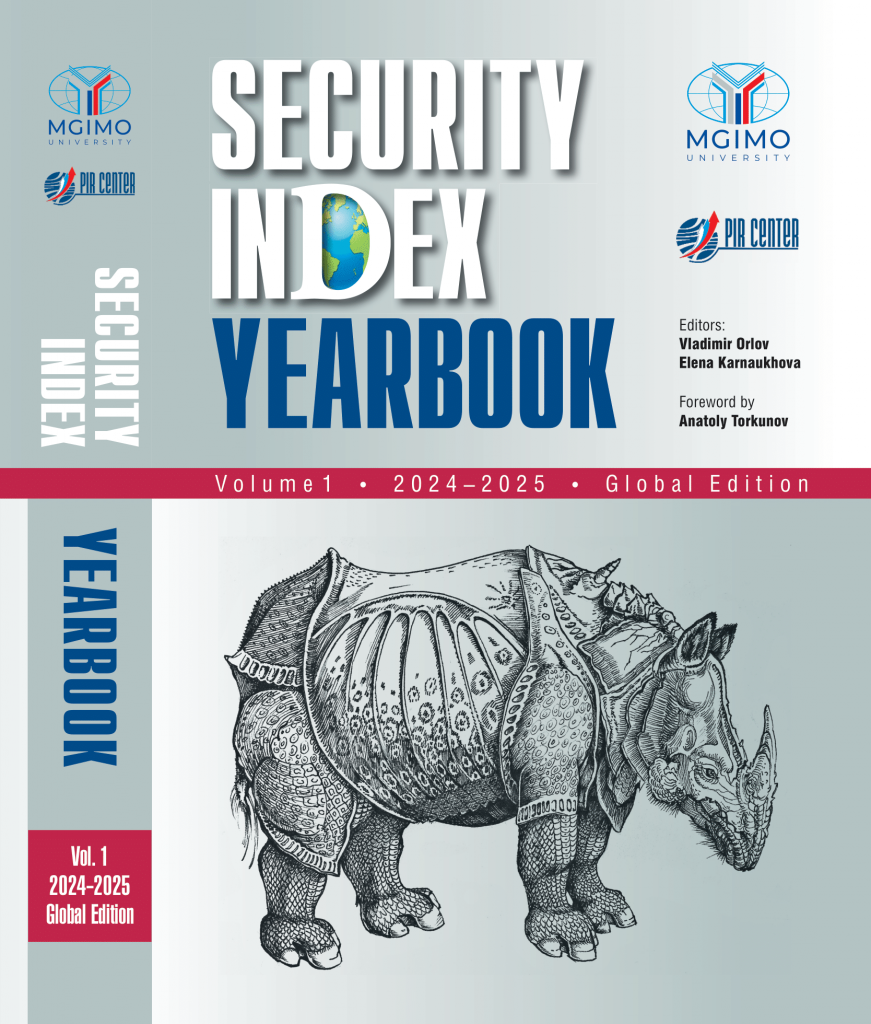Book Review
SECURITY INDEX YEARBOOK 2024-2025. Vol. 1.
Vladimir Orlov and Elena Karnaukhova (Editors). PIR Library Series № 37. Moscow: Aspect Press, 2024.
ISBN: 978-5-7567-1310-7
Today, a lack of globally focused publications with analytical materials written by Russian international relations experts is evident. It has become more challenging for the Russian academic community to deliver its views on topical issues of global security to a worldwide audience. However, such analysis is more in demand than ever. Russia remains an essential part of the international community and plays a significant role in achieving the Sustainable Development Goals; it is one of the critical actors in the global arena, holding the world back from sliding into chaos. Wars on narratives, which regrettably have been emerging in academia these days, do not contribute in any way to finding an efficient response to global challenges.
Security Index Yearbook is targeted primarily at foreign readers; it simultaneously pursues two goals: a strictly research-based one and a mix of analysis and public diplomacy – to inform foreign readers about Russian studies and analysis on international security. Russian academic materials published in English perform an important function of science for diplomacy. Cooperation among researchers has an indirect yet significant impact on policy decision-making. Discussions at academic platforms and collaborative publications allow us to grasp the positions of our foreign colleagues on various issues. At the same time, it contributes to a better understanding of the positions of Russian experts worldwide. Subsequently, this understanding is directly or indirectly translated into those circles where the official position is formed.
It is worth recalling the considerable contribution of researchers to the diplomatic settlement of the most burning global problem during the Cold War, such as the arms race, including the justification of the prohibition or the development of international control measures over modern weapons of mass destruction – nuclear, chemical and biological. Their recommendations and guidelines served as the basis for the development of the relevant international legal instruments, such as the Treaty on the Non-Proliferation of Nuclear Weapons (signed in 1968), the Agreement on Missile Technology Control Regime (adopted in 1987), the Convention on the Prohibition of the Development, Production, and Stockpiling of Bacteriological (Biological) and Toxin Weapons and on their Destruction (signed in 1972). A more recent example is the Arctic. The achievement of nearly all active agreements on the Arctic was preceded by detailed research and expert analysis, including under the auspices of the International Arctic Science Committee.
These are just a few examples of how science and research activities are on duty for diplomacy. I believe that the Security Index Yearbook will become a useful and recognizable tool for impacting the international debate on the most pressing issues of contemporary international security.
The Vol. 1 of the Yearbook you hold in your hands now covers global issues, such as international terrorism, arms control and nonproliferation of weapons of mass destruction, new conventional weapons, space security, and cyber diplomacy. Part II of this volume focuses explicitly on analyzing Russia’s relations with the world majority on international security issues. These are primarily Russian-Chinese and Russian-Iranian bilateral ties and multilateral dialogue formats with the BRICS countries, African and Latin American states.
I would like to praise the MGIMO University experts who represent a significant part of the author board of the Vol. 1 of the Security Index Yearbook. This is only one of numerous examples of fruitful cooperation between PIR Center and MGIMO, which has only been strengthening in recent years. In conclusion, I would emphasize that the academic community will benefit diplomacy if it is able to demonstrate convincing results of its research projects and present them in a format that enables them to become a core of practical decision-making.
The digital version of the Security Index Yearbook is available here!
Key words: International Security; Security Index Yearbook
SIY
F4/SOR – 24/11/05




